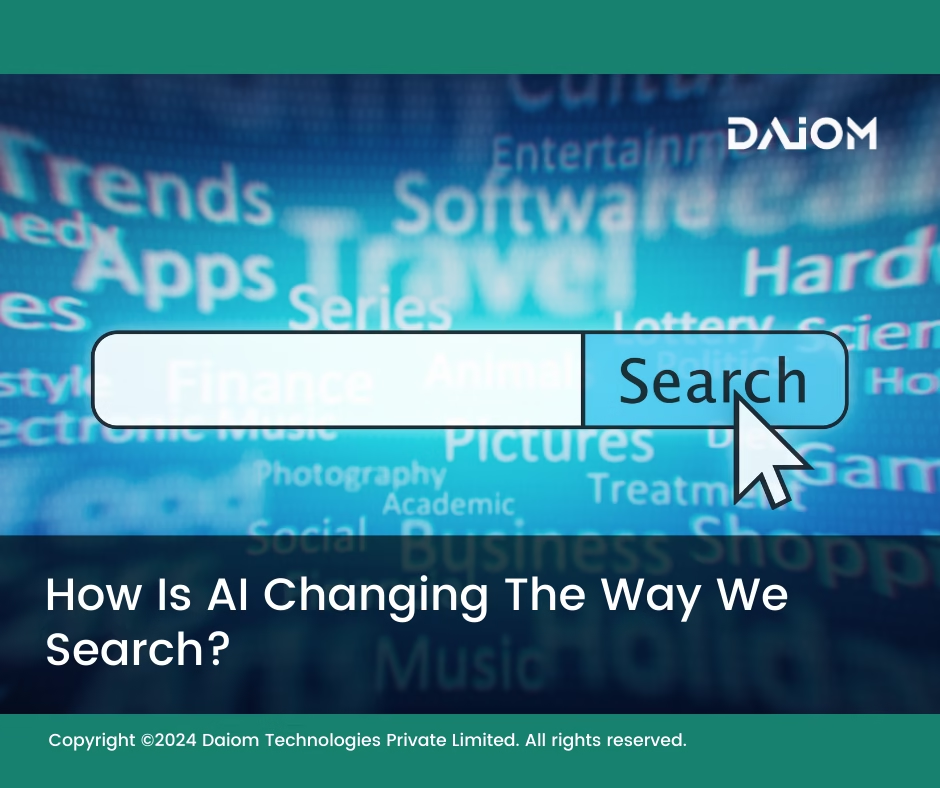For a long time, Google has been the go-to place for finding information online. We’ve all been used to typing a question into Google and getting answers. But now, things are changing.
According to Gartner, 30% of online searches are expected to be AI-driven by 2025, shifting away from traditional search engines. Moreover, AI tools like Perplexity AI claim to reduce search time by up to 40% by delivering direct, personalized responses instead of multiple links.
AI is transforming how we search, and new platforms like ChatGPT’s Search GPT and Perplexity AI are making their mark. These AI-powered tools are giving us faster and more personalized results, which could challenge Google’s dominance.
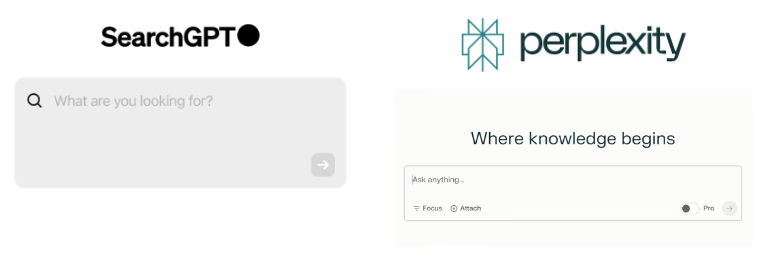
At DAiOM, we’re paying close attention to this change. We help our clients understand what these changes mean for their businesses and how they can adapt.
It’s not just about using new tools; it’s about rethinking the way brands connect with people online in this new world of AI-driven search.
In this blog, we’ll dive deeper into these changes and explore how brands can adapt to the new world of AI-driven search.
Artificial intelligence would be the ultimate version of Google. The ultimate search engine that would understand everything on the web. It would understand exactly what you wanted, and it would give you the right thing. We’re nowhere near doing that now. However, we can get incrementally closer to that, and that is basically what we work on.
Larry Page
Table of Contents
1. How Does AI Search Work?
AI search engines are transforming the way we access information. Traditional search engines typically rely on keywords and backlinks to find relevant content. However, AI-powered search tools take it a step further by understanding the intent behind your query. Let us understand this with an example:
Suppose you’re searching for ‘best running shoes’ on both a traditional search engine and an AI-powered search engine.
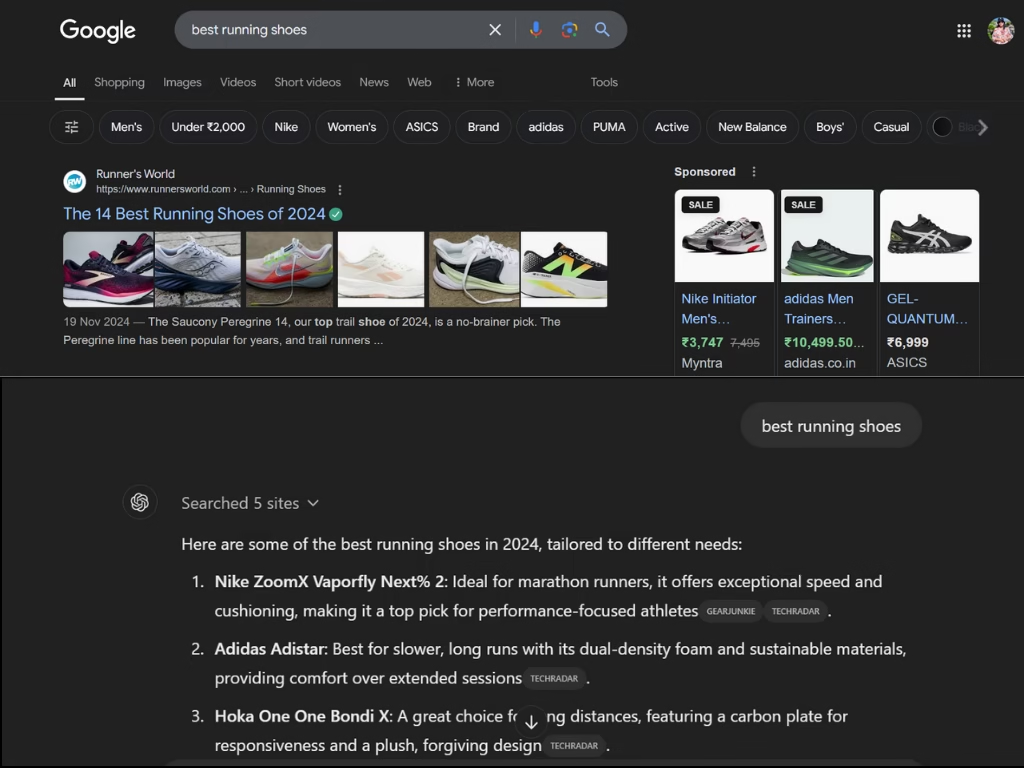
- Traditional Search Engine: You get a list of websites with product reviews, blog articles, and store listings, all based on keywords and backlinks.
- AI Search Engine: The AI provides a personalized answer, factoring in your preferences like your running style, location, and previous searches. It might even suggest shoes tailored to your specific needs, along with ratings and recommendations based on user reviews.
This comparison would help you understand how AI search engines are shifting from simple keyword-based results to offering more refined, personalized, and relevant information.
Instead of just matching words, they provide answers based on what you really mean, making the search process feel more like a conversation.
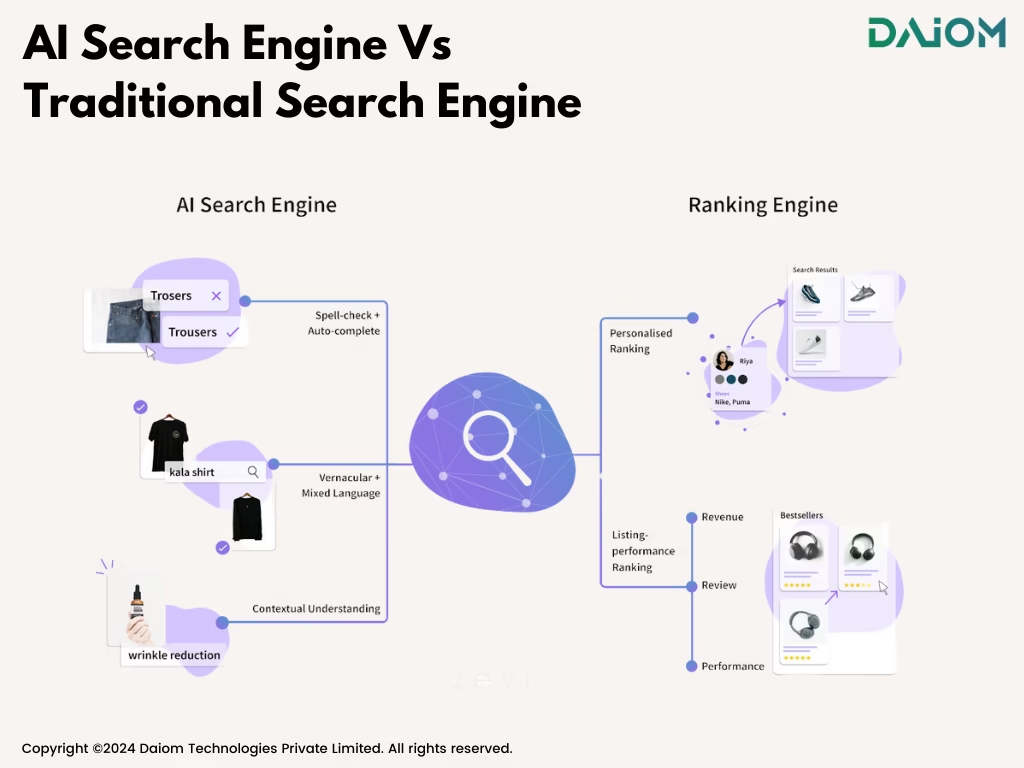
For example:
- ChatGPT’s Search GPT is built on Bing’s infrastructure, but it does more than just look for keywords. It understands the context of your search, offering detailed answers that flow naturally, almost like having a chat with a knowledgeable assistant.
- Perplexity AI is another tool that enhances the search experience. It pulls information from reliable sources and combines it to give you quick, accurate answers. This makes it easier for users to find exactly what they’re looking for, without wading through unnecessary results.
2. Why AI Search Engines Outperform Traditional Ones?
AI search engines bring several key advantages over traditional platforms. Here’s why AI search engines outperform traditional ones, and how they’re changing the way we search for information:
2.1 Detailed Answers with Source Citations
AI search engines don’t just give brief answers. They provide in-depth responses and often cite the sources they pull information from. This makes it easier for users to verify and trust the information they’re getting.
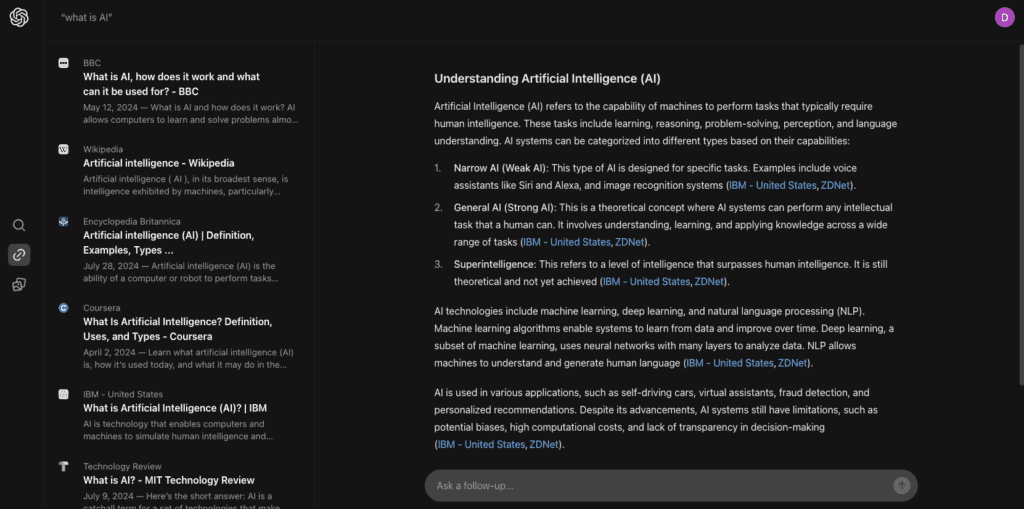
2.2 Follow-Up Questions
Unlike traditional search engines, AI tools can handle follow-up questions, adjusting their responses based on previous queries. This makes the search process more interactive and tailored to your needs, offering context-aware answers that feel more like a conversation.
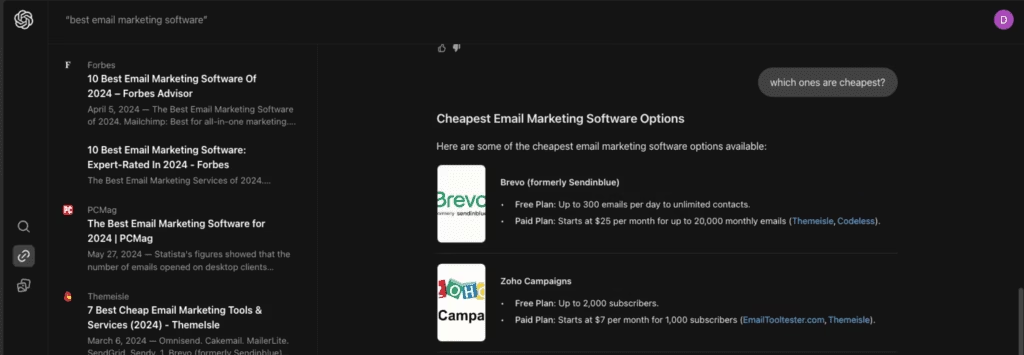
2.3 Local Search Results
AI-powered search platforms also make local searches more accurate. They use location data to show relevant results based on where you are, and you can even adjust your location manually for more precise results.
Read more – Local SEO: Marketing strategy to convert Online traffic to Offline

3. Why Ranking on AI Search Engines Matter?
Consumer behavior is shifting towards AI-powered search engines, and brands that adapt will succeed. Failing to embrace this trend risks losing visibility.
Here’s why ranking on AI search engines is so important, especially as consumer behavior shifts toward these platforms:
- For Established Brands: For well-known brands, ranking higher on AI search engines is key to maintaining market share. As more people rely on AI tools for information, staying visible on these platforms is essential to preserving a competitive edge.
- For Emerging Brands: Newer brands have a significant opportunity with AI search engines. Ranking well on these platforms can help them stand out from competitors and accelerate growth, allowing them to establish themselves in an evolving space.
Strong rankings on AI search engines ensure that a brand remains relevant and competitive in the digital era. It’s about staying ahead of the AI-driven transformation and not getting left behind.
Read more – How Podcasts Are Transforming Content Consumption with AI?
At DAiOM, we’ve been proactive in helping our clients succeed in this AI-driven space, crafting strategies that secure their position at the forefront of search innovation.
4. How to Adapt SEO Strategies for AI Search?
As AI search engines become more prominent, it’s important to adjust your SEO strategies to stay ahead. Here’s how you can adapt traditional SEO tactics to succeed in the evolving AI search landscape.
- Focus on Bing: A lot of popular AI search engines, like ChatGPT’s Search GPT, are built on Bing’s infrastructure. This makes it important to focus on Bing when optimizing your website. Use Bing Webmaster Tools to monitor your site’s performance and identify areas for improvement. This will help you ensure that your website is being properly indexed and that it ranks well in AI search results.
- Prioritize Local SEO: Local search is more important than ever in AI search. AI search engines rely on location data to provide relevant results. To make sure your business appears in local search results, keep your business listings accurate and up-to-date across platforms like Google and Bing. Additionally, make sure your website is mobile-friendly. Since more people use smartphones to search, having a responsive design will improve user experience and boost your search rankings.
Key Points to Note Here:
- AI search engines prioritize high-quality content that is engaging, relevant, and user-focused. To rank well, your content needs to answer the questions users are asking, and provide value in a clear and direct way.
- Metrics like time on page and click-through rates are essential indicators of how well your content is performing. If users stay on your page longer and click through to other content, it shows that your site is providing value, which can improve your ranking in AI search results.
- Lastly, building trust is crucial. AI search engines look for websites that show expertise, authority, and credibility. To build trust, ensure your content is well-researched, your site is secure, and you’re providing accurate and helpful information that establishes you as a reliable source.
5. Practical Steps to Optimize for AI Search
To optimize your website for AI search engines, you’ll need to combine traditional SEO with strategies that cater specifically to AI’s evolving algorithms. Here are some practical steps to help you succeed:
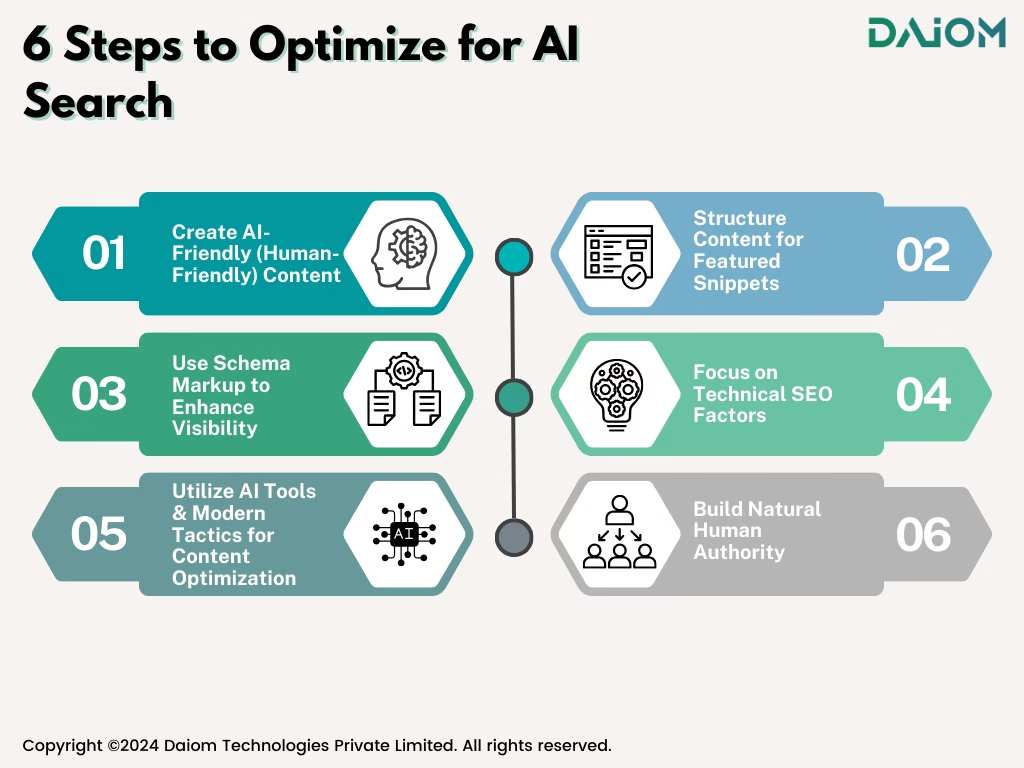
5.1 Create AI-Friendly (Human-Friendly) Content
To do well in AI-driven search, focus on creating content that both algorithms and readers find valuable:
- User Intent Optimization: Use tools like Google Keyword Planner to match your content with what users are looking for.
- Semantic Keyword Integration: Include related terms and phrases, not just the main keywords, to give context to your content.
- Clarity and Readability: Keep your content simple with short sentences, bullet points, and tools like Grammarly for polish.
- Update Old Content: Refresh your existing content with new insights to stay relevant.
5.2 Structure Content for Featured Snippets
Featured snippets often appear in AI search results. To increase your chances of being featured, do the following:
- Concise, Direct Answers: Start sections with brief answers to common questions.
- Utilize Lists and Tables: Organize information in easy-to-read lists and tables.
- Effective Use of Headings: Use clear headings to help search engines understand your content better.
- Leverage Text Fragments: Use “#:~:text=” links to point AI to key sections.
5.3 Use Schema Markup to Enhance Visibility
Schema markup helps AI understand the structure of your content, making it easier to index and display in search results. It enables AI-powered search engines to interpret and categorize information more effectively, improving your visibility in search results. Here’s what it does:
- Improved Search Results: Schema markup allows search engines to show rich snippets, like star ratings or product prices, which attract more clicks.
- Better Indexing: AI search engines prioritize well-structured content. Schema helps them index your content accurately, increasing the chances of appearing in relevant searches.
- Voice Search Optimization: AI assistants rely on schema markup to provide quick, accurate responses in voice searches.
- Increased Authority: Structured data signals to search engines that your content is reliable and relevant, potentially boosting your ranking.
5.4 Focus on Technical SEO Factors
A solid technical setup ensures AI can easily crawl and index your site:
- Mobile Optimization: Most searches are done on mobile. Make sure your website is mobile-friendly with fast loading times.
- Page Speed: Faster pages rank higher. Compress images to speed up load times.
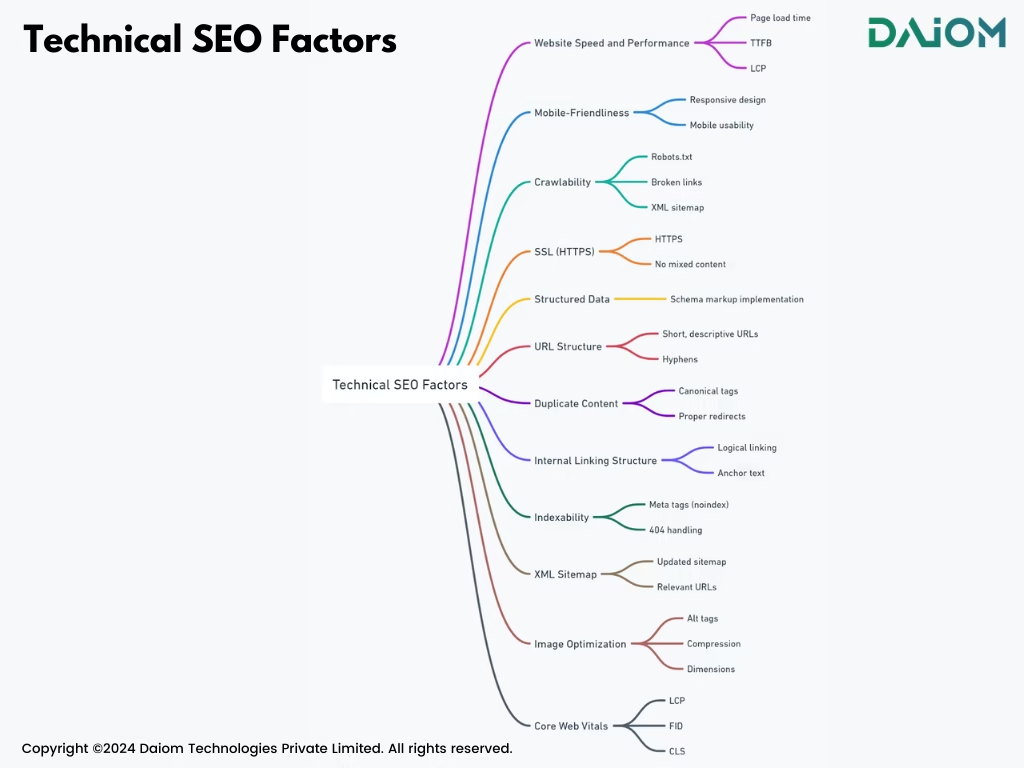
5.5 Utilize AI Tools & Modern Tactics for Content Optimization
AI tools can help improve your content strategy:
- Content Generation Tools: Tools like Jasper and WriteHuman can help generate content faster.
- SEO Analysis Tools: Use platforms like Ahrefs or SERanking for useful SEO insights.
- Voice Search Optimization: Use tools like AnswerThePublic to optimize for voice search and conversational keywords.
5.6 Build Natural Human Authority
AI values content created by trusted sources:
- E-E-A-T Factors: Focus on Experience, Expertise, Authoritativeness, and Trustworthiness to build credibility.
- Backlinks and Mentions: Get backlinks from reputable sites to boost your authority.
- Social Proof: Increase social media engagement to show relevance and authority.
6. 8 SEO Strategies That Always Work
To improve your website’s visibility and rankings, focus on these tried-and-tested SEO strategies that work every time:

- Get Mentions: Mentions help more people discover and trust your brand. You can achieve this by writing guest blogs, collaborating with influencers, or using platforms like HARO to get featured in media outlets.
- Show Expertise (E-E-A-T): E-E-A-T stands for Expertise, Experience, Authority, and Trustworthiness. Highlighting these builds credibility. Add author bios, showcase qualifications, and include references from reliable sources in your content.
- Cover Topics Completely: Comprehensive content answers all user questions, making your site more trustworthy. Write detailed articles that provide clear and thorough answers, and structure your content for easy reading.
- Create Human-Focused Content: Content that feels relatable and creative resonates with readers. Skilled writers can help you craft engaging material that connects emotionally with your audience while delivering value.
- Answer New Questions Quickly: Being among the first to address trending topics gives you an edge in AI search rankings. Stay updated on current trends and create timely, relevant content that solves new user queries.
- Make Content Easy to Read: Readable content keeps visitors engaged and improves user experience. Use tools like Hemingway Editor to simplify your text, break up long paragraphs, and use clear language.
- Use Different Content Types: Mixing formats like videos, infographics, and interactive elements makes your content more engaging. This variety appeals to a broader audience and keeps them interested.
- Organize Content Clearly: Clear structure helps search engines and AI understand your content better. Use schema markup and logical headings to organize your website and improve your chances of ranking higher.
The shift from traditional search engines to AI-driven tools marks the beginning of a more personalized, interactive internet experience.
7. Conclusion
AI is transforming the way we search, and brands must adapt to stay ahead. Updating your strategies can help you connect with your audience, build trust, and grow in today’s digital world. At DAiOM, we specialize in guiding businesses through this shift—helping you not just keep up but lead the way.
If you’d like to discuss how we can help enhance your customer retention and optimize your strategies, we’d be happy to set up a consultation call. Feel free to reach out to us at alibha@daiom.in
For more informative content and blog, follow and stay tuned to DAiOM.
Subscribe to our NEWSLETTER!


